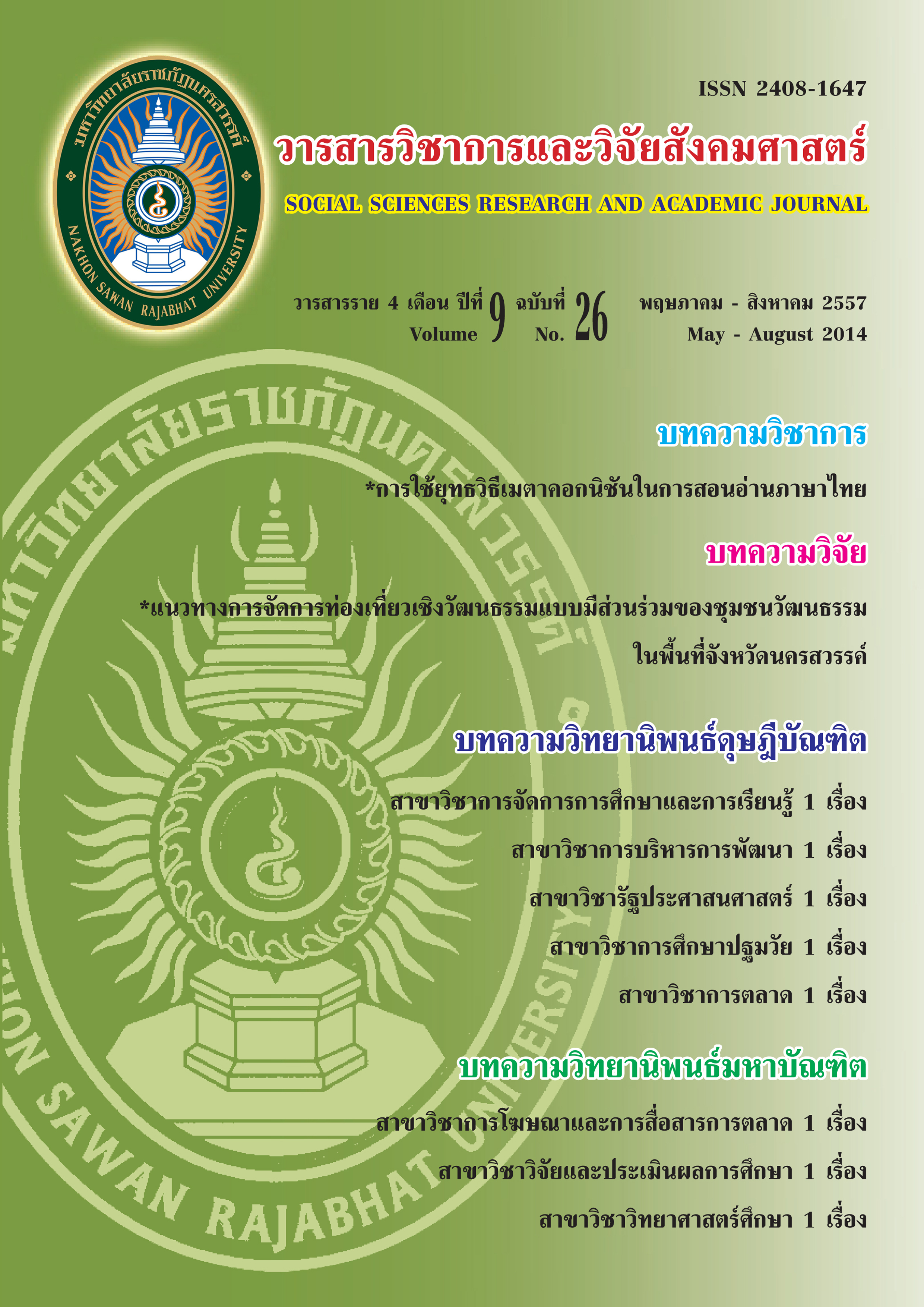แนวทางการจัดการท่องเที่ยวเชิงวัฒนธรรมแบบมีส่วนร่วมของชุมชนวัฒนธรรม ในพื้นที่จังหวัดนครสวรรค์ (The Approach for Cultural Tourism Management Through the Participation of Cultural Communities in Nakhon Sawan Province)
Main Article Content
Abstract
บทคัดย่อ
การวิจัยครั้งนี้มีวัตถุประสงค์เพื่อศึกษาเกี่ยวกับศักยภาพชุมชนและแนวทางในการจัดการท่องเที่ยว
เชิงวัฒนธรรมเน้นการสร้างกระบวนการมีส่วนร่วมของชุมชนและองค์กรท้องถิ่น มีกลุ่มผู้ให้ข้อมูลหลัก
(Key Informants) คือ ผู้บริหารและสมาชิกสภาท้องถิ่น กำนัน ผู้ใหญ่บ้าน ประธานสภาวัฒนธรรม ครูและนักเรียนและผู้นำชุมชนใช้แบบสอบถามประกอบการสัมภาษณ์ การสัมภาษณ์แบบเจาะลึก (In-Depth Interview) การจัดประชุม การอบรมเชิงปฏิบัติการ การจัดเวทีประชาคม การศึกษาดูงาน และนำร่องกิจกรรมการท่องเที่ยว ผลการวิจัยพบว่า ศักยภาพการจัดการท่องเที่ยวเชิงวัฒนธรรมทั้ง 3 แห่ง มีความพร้อมในการจัดการท่องเที่ยวเชิงวัฒนธรรม มีแหล่งเรียนรู้ประวัติศาสตร์ วิถีชีวิตกลุ่มชาติพันธุ์ ขนบธรรมเนียมประเพณี และภูมิปัญญาท้องถิ่นที่บ่งบอกเอกลักษณ์ชุมชน ด้านการจัดการท่องเที่ยวมีการพัฒนาแหล่งเรียนรู้ที่มีอยู่เดิมและพัฒนาแหล่งเรียนรู้ใหม่ มีการตระหนักถึงคุณค่า สร้างจิตสำนึกการจัดการทุนและทรัพยากรในชุมชน
การสืบสานวัฒนธรรมประเพณีและภูมิปัญญาท้องถิ่น การแลกเปลี่ยนเรียนรู้ชุมชนต้นแบบในการจัดการท่องเที่ยวเชิงวัฒนธรรม การอบรมการจัดการท่องเที่ยวเชิงวัฒนธรรม กิจกรรมเรียนรู้การจัดการวัฒนธรรม เพื่อส่งเสริมการท่องเที่ยว ส่วนแนวทางการจัดการท่องเที่ยวเชิงวัฒนธรรมแบบมีส่วนร่วมได้จัดเวทีแลกเปลี่ยนเรียนรู้ค้นหาศักยภาพ การระดมความคิดการจัดตั้งคณะทำงาน การประสานร่วมมือกับเครือข่ายเชิงพื้นที่และ
เชิงประเด็น มีการจัดระบบข้อมูลข่าวสาร การจัดการทรัพยากร การพัฒนาแหล่งเรียนรู้ จัดกิจกรรมนำร่อง
การท่องเที่ยวเชิงวัฒนธรรม การจัดทำแผนพัฒนาชุมชนวัฒนธรรม จัดระบบข้อมูลด้านวัฒนธรรมพื้นบ้าน การจัดตั้งกองทุนชุมชนวัฒนธรรม การจัดตั้งคณะกรรมการชุมชนวัฒนธรรมที่ประกอบด้วยผู้มีส่วนเกี่ยวข้องภายในชุมชน
Abstract
The purpose of this research was to study potentials and ways of cultural tourism management focusing on the development of participatory process between the community and the local organization. Key informants were executives and local council members, sub-district leaders, village headmen, cultural council chairperson, teachers, students, and community leaders. Questionnaires and in-depth interviews were used. Meetings, trainings and workshops, public forums, study visits, and pilot tourism activities were held.
The findings are as follows: Potentials for cultural tourism management of all 3 places indicated that they had readiness in organizing cultural tourism due to having historical study resources, ways of life of the nationalities, customs and traditions, and local wisdom specific to the identity of the community. In the aspect of tourism management, development had been given to old learning resources as well as new ones. There was awareness in values; consciousness had been built in managing the capital and resources of the community by inheriting and passing on their customs and traditions as well as local wisdom. There were knowledge sharing and trainings about prototype community in cultural tourism management. There were cultural management learning activities to promote tourism. As for the approach for cultural tourism management through participation, knowledge sharing forums were arranged to search for potentials, to brainstorm, and to set up
a working group. Co-ordination and cooperation between networks had been done in terms of areas and topics dependent on the community. The information system was set up. There were also resource management, development of learning resources, and pilot activities for cultural tourism. Cultural community development plans had been made as well as the local cultural data system. Cultural community funds were set up as well as a cultural community committee.


